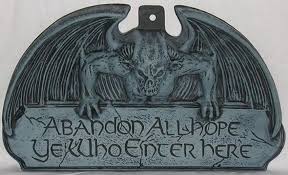The essay "Hell: The Nemesis of Hope" was written by Nik Ansell and published in The Other Journal in 2009. Read the essay here.
An updated form of the essay also makes an appearance as the Afterword in Her Gates Will Never Be Shut by Brad Jersak.
A few citations from the essay:
Despite the Church’s curse, there is no one
so lost that the eternal love cannot
return—as long as hope shows something green
—Dante, Purgatorio, Canto III. 133–1351
The traditional claim that the eternal suffering of the impenitent serves to glorify God by revealing his justice reduces the revelation of God’s glory to the restoration of God’s honor, thus separating the glory of God from the glorification of creation.
It is worth reminding ourselves, especially in this age of ecological violence and crisis, that the annihilation and destruction of God’s good creation is precisely the aim and goal of evil, not evidence of its defeat. The destruction, including the self-destruction, of those made in God’s image represents a victory for the forces of darkness. In the transformation of everlasting punishment into final judgment, evil still has the last word.
But as this is an earthly place outside Jerusalem and as the “last days” are clearly understood as taking place within history, this is very different from the Gehenna of later rabbinic literature in which the Valley of Hinnom has become an underworld or otherworldly realm that has been in existence since the creation. Such a place can indeed be identified with the Hell of traditional Christian theology. But these later Jewish texts all come from a time after the destruction of Jerusalem in AD 70 when the Jewish worldview was thrown into crisis, to be recast by the rabbis into a far less geographically rooted form.
Contrary to popular belief, no Jew in Jesus’s day was expecting God to bring about the end of the space-time universe. But the destruction of the temple, which was built to symbolize the creation, thus revealing God’s presence within it, would be seen as truly cataclysmic. For Jesus, this was God’s judgment on Israel, signaling nothing less than what we might call the end of the old world order. The only appropriate language was the language of de-creation.
It is significant that here, in the most sustained discussion of the general resurrection in the New Testament, there is no mention of Hell, either as eternal torment or as annihilation. But this should come as no surprise, I suggest, as the Christian doctrine of Hell, for all the appeals to Scripture that have been made on its behalf, has no biblical basis.
Generalizations have their limits, but a good generalization is generally true. More often than not, I suggest, the church has gone on to recapitulate the sins of Israel: calling God’s wrath down on sinners, setting itself “over” and “against” the world, hiding its true light under a bushel. The Roman Empire fell. Christendom was born. The Holy Roman Empire, as it came to be known, ruled the world, threatening all who would not toe the line with the fires of eternal torment. There is a place for nuanced historiography, but to those who were oppressed by the church when it was at the height of its powers, this would not be seen as a caricature. The secular critique of Christianity, for all its one-sidedness, is not without foundation.
If the Christian era came to an end with the dawn of the Enlightenment, which, in it's secular form, attacked the church for its evils, not least for its cruel doctrine of Hell, then instead of condemning it, should we not, first and foremost, ask whether the dawn of the modern age can be seen as God’s judgment against the church? Even as we may also ask whether, given the violence with which modernity has dealt with people of faith, God has now handed modernity over to its postmodern critics.
The good news of Gehenna is that for those who have ears to hear and eyes to see, the attempt to invoke God’s judgment as an end in itself, as final, is revealed as a dead end. Such a spirituality does not belong to, and cannot be a part of, the life of the age to come. Thus, in looking back over church history at the rise and fall of the doctrine of Hell, we may be set free to develop an eschatology in which hope is allowed to triumph over fear.




No comments:
Post a Comment